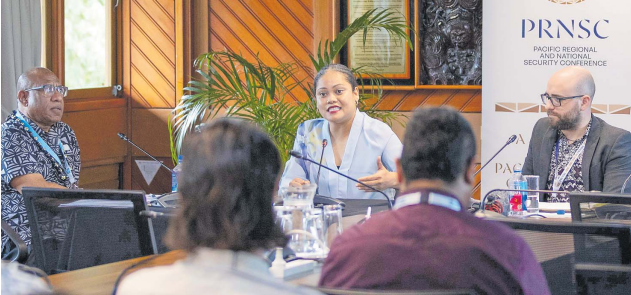In an era where nearly every Pacific Islander can connect to the internet, digital opportunity walks hand in hand with digital danger.
That was the urgent message delivered by Fijian cybersecurity leaders at the Pacific Regional and National Security Conference, where delegates were warned that unless cybersecurity is embedded from the very start, the region’s digital transformation could become a digital trap.
“One of the key priorities for Government is to ensure that we provide meaningful and secure connectivity to our people so that they can utilise technology in a way that empowers their lives and raises their livelihoods,” said Tupou Baravilala, Fiji’s Director-General for Digital Government Transformation, Cybersecurity and Communications.
Calling the region’s expanding internet infrastructure a “fresh digital landscape”, she said Pacific countries had a rare window to leapfrog the legacy problems that plague developed nations.
Digital empowerment, Ms Baravilala warned, comes with a catch.
“At the same time, we must ensure they are equipped with the knowledge, tools, and the skill sets to be able to safely navigate these online spaces.”
“There’s a lot that we’re doing in terms of digital transformation… and I think it is definitely an opportunity for the Pacific,” she said.
“The opportunity for our region is, as we’re beginning our digital transformation journeys, we need to adopt cyber security-by-design and data-protection-by-design approaches, ensure the integrity of our supply chain, ensure a robust talent pipeline, and inculcate a culture of cyber hygiene in our communities and businesses.
“We have a window now – as we embark on our digital journey, to bake in cybersecurity-by-design, data protection-by-design, and to foster a culture of cyber hygiene,” she said. “It’s not just about technology. It’s about building trust.”
That trust, however, is under threat.
Savenaca Siwatibau, who leads Fiji’s Critical Infrastructure Cyber Security Unit, said cyber criminals are moving fast, targeting Fijians as internet access expands.
“Fiji has increased its connectivity threshold to 96 per cent because the community is starting to see the benefits of technology,” he said.
“Now the big issue here is, how can government protect this community?
“We need to ensure that we have the right policies, the right legislation and the technical capability to be able to strengthen the security of those that use these platforms.”
He said protection must start at the top but it must reach everyone.
“That is the only way that we can ensure that we are providing a safer environment that people can thrive on in the use of technology.”
In a panel session titled Technology: the promise and the peril, experts warned of a region under siege, from cybercrime to misinformation and digital manipulation.
Matthew Watson of the UN Office on Drugs and Crime issued a stark reminder.
“We could all go on Facebook collectively while in the same room, and we won’t all see the exact same thing,” he said.
“Whether it’s due to various algorithms, AI-generated content, or differing interests, we’re all getting a different story and a different view. That’s huge for society. For better and for worse.”
Mr Watson said law enforcement and governments were struggling to keep pace.
“We need to make sure that citizens, children, and adults have an awareness of the problems caused by digital illiteracy and misinformation.
“This must be embedded at an educational level.”
The panel’s calls echo key priorities under the 2050 Strategy for the Blue Pacific Continent, particularly Pillar 3 on Peace and Security, and the Boe Declaration’s commitment to tackling cybercrime and information warfare.
Among their recommendations: harmonised regional laws, deeper co-operation, stronger investment in cyber skills, and a Pacific-led approach that blends modern tools with local values.



